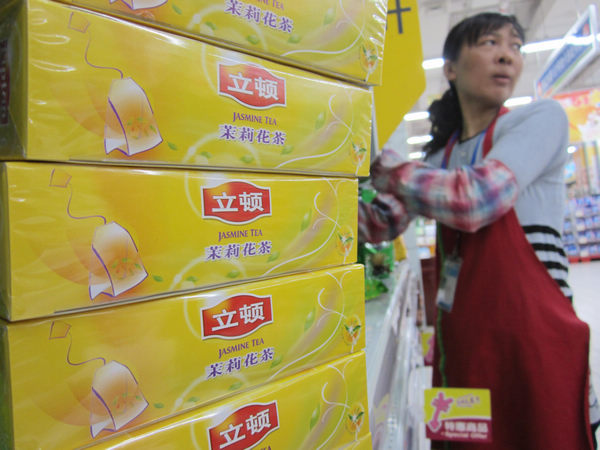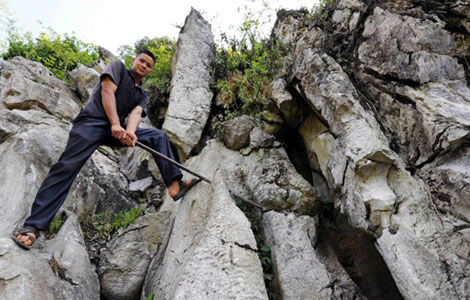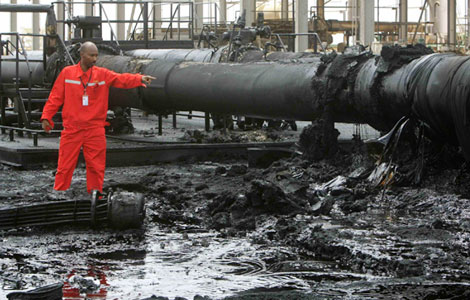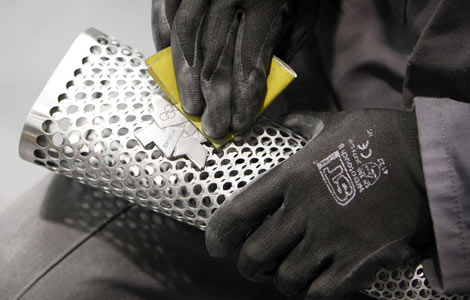 |
|
|
|
|||||||||||
Unilever answered allegations that a banned pesticide was found in Lipton tea, saying on Tuesday that all of its products are safe.
"Unilever China has always upheld high quality standards and the protection of consumers' rights. All the Lipton tea products we make are completely in line with national standards on pesticide residue, and are safe and up-to-standard goods," the company wrote on its micro blog.
|
 |
|
Lipton jasmine tea is sold in a supermarket in Nantong, Jiangsu province, on Tuesday. Provided to China Daily |
According to a report by the environmental protection organization Greenpeace, however, methomyl, a pesticide banned in China, has been detected in some Lipton teas.
"Despite their statement that their pesticides comply with national standards and that they are determined to minimize the amount of chemicals, the facts prove it is nothing but empty promises," said Wang Jing, a Greenpeace executive in charge of food and agriculture in Beijing, who was involved in the investigation.
In addition to methomyl, residue from 17 other pesticides was detected, according to the Greenpeace report.
In March, random samples of Lipton's black, green, jasmine and tieguanyin teas were tested in Beijing. No pesticide residues were found in the black tea, but residue from 13 pesticides was found in the green and tieguanyin tea and residue from nine in the jasmine tea, according to Greenpeace.
Wang said the tests were conducted by an independent, nationally qualified laboratory, but she declined to disclose its name to "ensure its independence".
Seven of the 17 pesticides that were found are prohibited in the European Union, including endosulfan and bifenthrin, which according to EU health officials might jeopardize men's fertility and fetal health.
"Lipton must immediately stop using highly toxic pesticides and must reduce the amount of pesticides used in tea fields," Wang said. "The company should also improve its source-tracing system to better follow the tracking of the tea and better guarantee food safety."
Unilever's statement said all of the raw materials for Lipton black tea products sold on the Chinese mainland are 100 percent imported.
Wang said that although some of the products comply with Chinese standards, they fail to meet EU standards.
"Such products would definitely be turned down by European markets," Wang said. "It's unfair that products that fall short of EU standards are sold to unknowing Chinese customers."
In November, Lipton's tieguanyin tea was found to contain unsafe levels of rare earth, according to the General Administration of Quality Supervision, Inspection and Quarantine, the country's top quality watchdog.
The company later recalled and destroyed those products, according to a statement posted on its Chinese micro blog.
Lipton is not the only tea brand whose products have recently been called into question.
According to a Greenpeace report on April 11, at least three pesticides banned by the Ministry of Agriculture were detected in products from nine major tea companies, including Zhang Yiyuan and Wu Yutai.
Those two companies later responded that they were not using the banned pesticides in their tea fields, but that did not mean they were totally free from such chemicals.
According to Wang Jianhua, an expert on pesticide residues at Shandong entry-exit inspection and quarantine bureau, pesticide residues can be discovered long after the chemical is used. "For some pesticides, it takes years for them to degrade," said Wang.
He added that the residue does not necessarily indicate that the product is not fit for the market.
Contact the writer at [email protected]

|

|

|

|

|

|